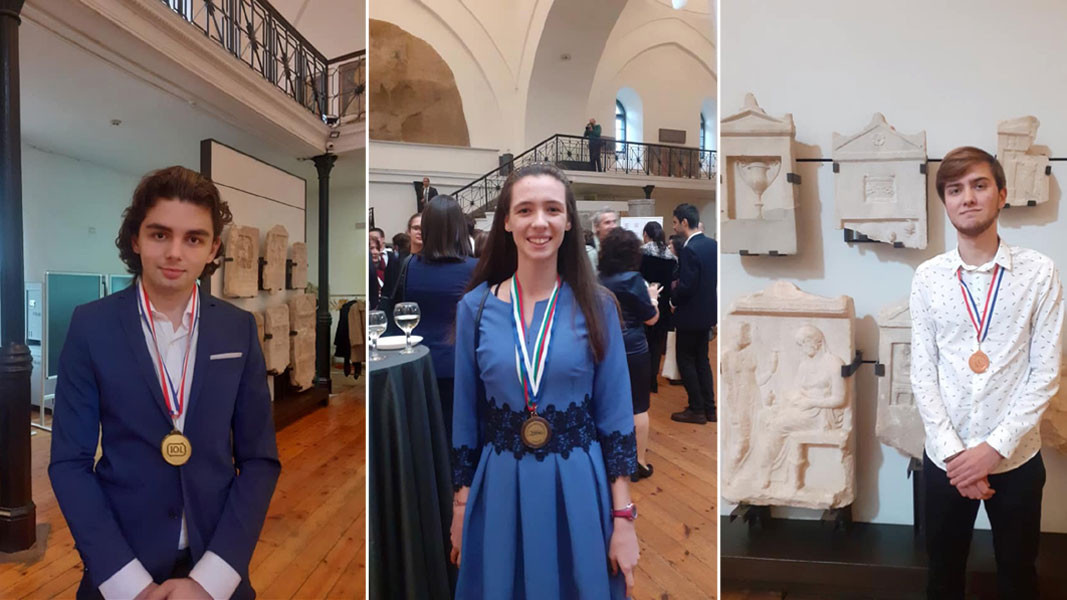Seventy-nine medals and honorary diplomas from international Olympiads – this is the number of distinctions won by the school natural science teams from all parts of the country by the end of the year. Their annual meeting at the National Archaeological Museum was attended by President Rumen Radev who congratulated them on their achievements.
President Radev addressed the Olympians, wishing them that they become the face Bulgaria is recognized by in the world because they are the people who will help the country thrive.
“Battling on exceedingly difficult terrain, you have been standing your ground but have also been working to advance science, working and battling for the future of Bulgaria – a future increasingly dominated by science, by innovation, by digitization,” the Bulgarian head of state said in his address. “Alongside all favourable factors we have been attracting foreign investments with, you are one of the most important incentives for this to happen, you and your incredible achievements. Because for a country of seven million to match its strength against giants like the US, China, Russia, Japan, it has to be in possession of the capital that matters most – talented young people with a huge potential.”
Maria, Matey and Victor wore the medals they had won in competition with the world’s best. “It is true, this is the same kind of challenge and we face it the same way that we battle for our goals,” Maria Drencheva from the Sofia secondary school of mathematics agrees with another medalist who says that victory at an Olympiad is like climbing Everest.

This year Maria won a gold medal at the mathematical Olympiad in Iran and the bronze at the Junior Balkan Mathematical Olympiad.
“I was competing with myself, and with the problems which really were challenging,” Maria says. “But it is the difficult problems that are most gratifying and when you solve them you feel you are doing something that ultimately brings satisfaction. Mathematics is something wonderful because of its logic and the inspiration you need to be able to come up with something new and use it to solve the problem.”
Linguistics is a hybrid field where languages and mathematics meet up, and it helps you cope with both better. That is how Matey Petkov from the national secondary school of mathematics and natural sciences in Sofia explains the place of linguistics in natural science competitions. With the help of mathematical models he was able to find his bearings in the logic of language at the linguistics Olympiad in South Korea, and he did so better than any of the other participants.
“You do not need to know a large number of languages to do linguistics,” he says. “At the Olympiad we had to solve five problems in languages utterly unknown to any of the participants, and that is an easy thing to do because right now there are more than 8,000 living languages in the world. By way of examples we had to find the hidden models in these problems and understand the logics of the languages themselves. Computational linguistics is also widely applicable in machine translation. As a matter of fact Google Translate works precisely because of the principles of linguistics.”
Victor Baltin from the secondary school of mathematics and natural sciences in Bourgas, who won a bronze medal at the same Olympiad, adds that at a competition he usually takes on the role of an explorer going to a lost community and trying to communicate with the people in it. At the Olympiad he had to “communicate” in one of the Indian languages, in Old Persian, in languages no longer spoken in Indonesia, Africa and South America.
“I knew nothing about the Indian language but it was our task to find out how to compose colours in this language,” Victor says. “We had to realize that colours are connected with objects of the colour in question – for instance instead of “black” the Indians say “coffee-coloured”. Instead of white – “milk-coloured”.
Matey, Victor and Maria will soon be graduating secondary school and will probably choose to study at a university abroad. But all three say they want to work for Bulgaria and build their future here.
Photos: Diana Tsankova
Support for the activities of the Institute of Social Activities and Practices in Sofia is the cause that will unite organizers and guests of the Viennese Ball, which has become a tradition for the Bulgarian capital. This year's edition, scheduled..
Topics related to renewable resources and natural disasters united students from the Bulgarian Sunday School "Assen and Iliya Peykovi" in Rome, the First English Language School in Sofia and the Greve High School near Copenhagen. The project aims to..
More than 50 wine producers from Bulgaria and Greece are going to take part in the contest for best wine with which the two-fay wine festival will kick off in Delchevo village near Gotse Delchev. Expert oenologists will evaluate a total of 134..
The Aviation Training Center at Sofia Airport has received accreditation from the Airports Council International (ACI) and joins the..
The Museum of the Bulgarian National Revival in Varna presents a collection of 15 authentic folk costumes from the collection of the..

+359 2 9336 661
